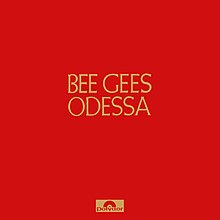Odessa (Bee Gees album)
| Odessa | ||||
|---|---|---|---|---|
 |
||||
| Studio album by Bee Gees | ||||
| Released | 30 March 1969 Sept. 1976 (RSO single disc version) 13 January 2009 (reissue) |
|||
| Recorded | 12 July – December 1968 IBC Studios, London, Atlantic Studios, New York and Trident Studios, London |
|||
| Genre | Pop,baroque pop | |||
| Length | 63:49 | |||
| Label |
Polydor Atco Records (US) RSO Records |
|||
| Producer | Robert Stigwood, Bee Gees | |||
| Bee Gees chronology | ||||
|
||||
| Singles from Odessa | ||||
|
||||
| Professional ratings | |
|---|---|
| Review scores | |
| Source | Rating |
| AllMusic | |
| Glorious Noise | (recommended) |
| Pitchfork Media | (7.2/10) |
| Rolling Stone | |
| Tiny Mix Tapes | |
Odessa is the sixth studio album by the Bee Gees, originally released on 30 March 1969. Regarded as the most significant of the group's Sixties albums, it was released as a double vinyl record initially in an opulent red flocked cover with gold lettering. An ambitious project, originally intended as a concept album on the loss of a fictional ship in 1899, it created tension and disagreements in the band regarding the album's direction; finally, a dispute over which song to release as a single led to Robin Gibb temporarily leaving the group. The album was not well received by the public or the music press on release, and led to a decline in the group's fortunes until their disco period in the mid 1970s.
Released in March 1969 by Polydor Records in the UK and Atco Records in the US, it was the group's fourth album released internationally, their sixth overall, and their only double album of original music. Odessa would be the final album for the band's original incarnation, and this was the last album to include guitarist Vince Melouney. The album contains "First of May", "Lamplight", "Marley Purt Drive" and "Melody Fair".
The album was reissued as a single-disc in 1976 when interest was revived in the Bee Gees career, since then the album has gained increasing critical acclaim; it was reissued again in 2009 as a deluxe 3 disc set, and is included in 1001 Albums You Must Hear Before You Die.
The originally intended name for the album was An American Opera. This later became Masterpeace and finally Odessa.
Colin recalls about the country influence on Odessa. "It was my idea that we do that sort of thing, and Maurice is the one who will take more time out to listen to what I have to say, although within the group, the okay has to come from Barry". Their manager Robert Stigwood says, "Barry is the Bee Gees coordinator, I used the word advisedly, as there is no leader of the group as such. He has a tremendous feel for soul music a la his composing work for The Marbles, but he is also a fantastic solo singer in his own right".
...
Wikipedia
